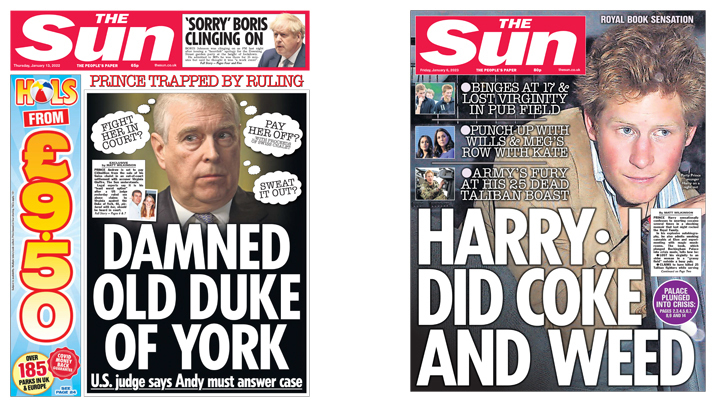
Harry – so much to say
And so we begin 2023 as we did 2022, with the Press in full cry over the shameful behaviour of one of the monarch’s sons.
Last year, it was Andrew; this year it’s Harry. I think if you were to ask anyone you happened to pass in the street which disgraced Duke’s behaviour was the more shameful, they’d plump for York over Sussex. Unless the street happened to be Derry Street or London Bridge Street. For Harry has declared war on the British Press. Actually. In so many words. He has made changing it his life’s mission. Good luck with that.
He has given interviews (that never works out for the royals), he has filmed a documentary, and now he has written a book. And the recurring theme has been that he has been hounded by the Press all his life, that the royal household has made a pact with these devils, and that for the sake of his sanity, he had to get out.
OK, says the Press, if you want to get out, go. But don’t go accusing us of invading your privacy when you’ve invaded it yourself with your endless bleatings and self-publicity. There is a wilful refusal to understand that if I choose to show someone – or even a million people – a photograph of myself or to share my thoughts with them, that is not the same as someone else snatching a picture and publishing it or listening to my phone conversations and reporting them or paying people I know for snippets of information about me.
There is no doubt that people are wearying of the Sussexes; the phrase “They don’t help themselves” has been uttered in my household more than once – and everyone here is generally sympathetic to them. The notion that they should just shut up is a popular one, fostered by the very papers that carry in big type every word they utter and print every picture they issue across their front pages. Even the Daily Star, which goes in for the ultimate cakeism by referring them to “publicity shy couple” and covering their eyes with typographical “tape” and then reporting the latest episode in the soap opera.
Now, imagine for a moment that Harry and Meghan were not an uber-privileged rich couple who had swapped an English palace for an American mansion. Suppose they were a surgeon and a nurse who had given up work in an English hospital and moved abroad. Suppose the reason they had left the hospital was because they didn’t like the working conditions and had witnessed malpractice that they believed put lives and the NHS in jeopardy. Having taken the metaphorical advice ‘if you can’t stand the heat…’ should they then just shut up? Or should they speak up about what they have experienced and witnessed, in the hope of making things better for others in the future?
If they say nothing, nothing gets changed. There is no chance of it. If they speak up, there will be people who say, “They would say that, wouldn’t they? They’re just disaffected employees. They weren’t up to the job. They couldn’t cope. Nobody else is moaning. Everyone else just gets on with it.”
Two individuals pitching themselves against the great establishment are almost always on a hiding to nothing. They won’t win. They might as well save themselves the aggro and give up.
That’s what the establishment always wants. And in this case, the establishment is the British Press – bolstered by the ostensibly-silent-but-constantly-briefing Palace and no small number of MPs. All of whom are consumed by their own self-importance.
As every newspaper editor and politician knows, if you are campaigning for something, you have to keep hammering your message home. You don’t say it just the once. You create soundbites – “education, education, education”, “strong and stable”, “Get Brexit done” – and repeat them over and over. You dripfeed new anecdotes and introduce new voices to keep your message fresh. This is what Harry and Meghan are doing. It’s all very well the media (broadcasters – particularly the BBC – are just as bad as the papers in this) talking about this as a “family rift” that should be resolved in private. It isn’t. It’s about the whole way the Palace and the Press operate. They may talk about mutually beneficial agreements, but it feels more in the nature of a nuclear deterrent pact. Each needs and uses the other. Harry’s beef with his family is that they go along with it, that they play the game, which he thinks should stop. His family may counter that it’s their job, their duty, to keep things as they are. Those are pretty big constitutional issues to be argued out “in private” over a beer by the fire.
In the end, it doesn’t really matter whether you believe or sympathise with Harry, the one thing our newspapers absolutely shouldn’t be doing is exactly what they are doing: telling him to shut up. First of all, the book apparently sold 1.4 million copies on its first day on sale. That suggests there are a lot of people out there who, far from wishing he would go away, are interested to read what he has to say – and in context, rather than the filleted offerings in the newspapers.
Second, these are the very organs that drone on, week in, week out, about the right to free speech. We can say what we like, within the law, but there is no obligation on anyone else to listen, heed, share or promote our views.
We don't need to read Harry's book, the papers could ignore him. They choose not to, presumably because they think it's their "duty" to report what he says. But why? He doesn't live here anymore, we don't finance him, he has no royal role. Papers don't routinely report on people who don't matter spouting nonsense – if that's what they think it is. Or because people are interested; because what he's saying might threaten the status quo? If those are the reasons, doesn't that kind of prove his point?
I think the problem probably lies with us, the readers, rather than with him, the writer.
What a difference a decade makes

A quick word about that Afghanistan death toll. As a closer examination of the passage in question quickly showed, Harry didn’t “boast” or “brag” about the number of people he had killed. Was it wise to give an exact number? I’m not sure. It’s usually better to be precise than vague. I think the problem probably lies with us, the readers, than him the writer. We send our troops to warzones in the knowledge that they will kill and possibly be killed. We don’t want to know the details. That’s our squeamishness, like not wanting to know how our roast lamb got on our plate. It’s unsettling to be confronted by a man willing to “own” his actions so specifically.
But this isn’t supposed to be a column dealing with moral dilemmas. It’s about the Press. So I would just mention that almost exactly ten years before that section of the book was leaked, the Sun and Mail ran jingoistic lead stories about how Harry had killed Taliban – the Mail’s story was written by the same woman who wrote the latest one headlined, “Astonishment as he declares: I killed 25 Taliban fighters”. The Sun had earlier reported that Harry had killed a Taliban “chief” and ran a spread inside about how he was regarded as a hero by fellow soldiers, who called him Big H.
The Mail then followed up the disclosure with a column by Colonel Tim Collins saying he should not be denounced for sounding flippant in talking about “taking people out of the game” as this was all part of services lingo. Now Collins is among the retired military tut-tutting because he has dared to put a number on the people he – in Collins’s words of a decade ago – knowingly “smashed to smithereens”.
Meanwhile, newspapers are calling those people his “victims” – because that’s always the word you use to describe your enemy in time of war. And the Mail is seeking quotes from the Taliban. As you do with people you have been fighting for two decades. Who doesn’t want to hear the opinion of a regime that has systematically repressed its own citizens, especially women, who are now allowed neither to go to school nor to see a male doctor? Its view on how a member of our own royal family did his job in the field of conflict is an essential element of the story. I know I’m always going on about giving all sides of a story, but I think that’s taking the principle to extremes.
[Incidentally, the Taliban the Mail is approaching for a view on Harry is the same Taliban that has threatened to murder two young Afghan journalists. The Mail is always eager to emphasise the importance of journalists and journalism to freedom and democracy, so it would be nice to think it might help these Afghans to live safely. You can read their story here.]
There is too much to say about Harry and Meghan. Read what you will in the Press. But may I, as an antidote, suggest that you also take a look at what Mic Wright has to say on Substack. Then maybe read the book. And decide for yourselves. Newspapers tend to have forgotten that their job is to tell you what is happening and leave readers to make up their own minds.
2022 and all that
The Royals
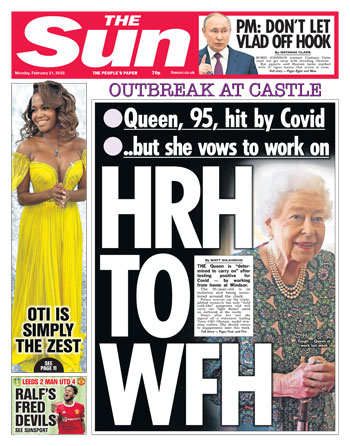
Enough of all that. I’m not supposed to be here this week, other than to conclude a belated review of last year.
Well, perhaps not quite enough of all that. As ever, there were an awful lot of royals on the front pages in 2022. The Queen caught covid, worked from home (somehow escaping the wrath of the Mail in doing so), reached a record milestone for reigning, celebrated a platinum jubilee, saw off another prime minister and then died.
Prince Andrew thought he might have to face a trial by jury for sexual assault, paid off his accuser, escorted his mother to his father’s memorial service, got grumpy when he lost not only his military titles, but his princely privileges, and was allegedly given £750,000 by a Turkish millionairess to pay for his daughter’s wedding.
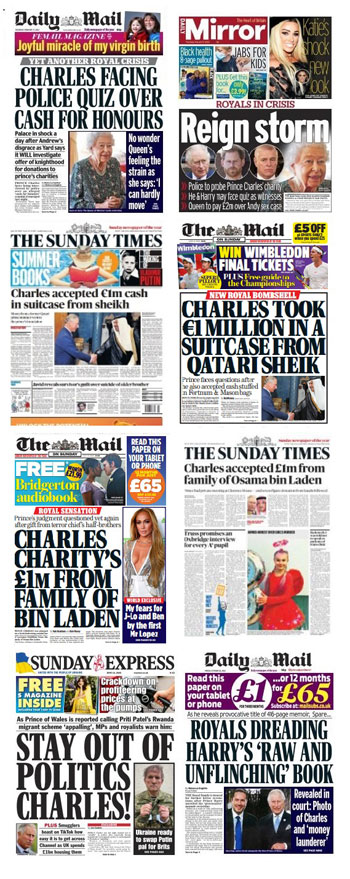
Prince Charles got tangled up in a cash-for-honours scandal and accepted €1m in cash in a suitcase from a Qatari sheikh, while his charity was said to have taken £1m from a relative of Osama bin Laden. He also said rude things about the plan to send asylum seekers to Rwanda and was told roundly by the Daily Express to “keep out of politics”. But he’s King now, so all that is water under the bridge.
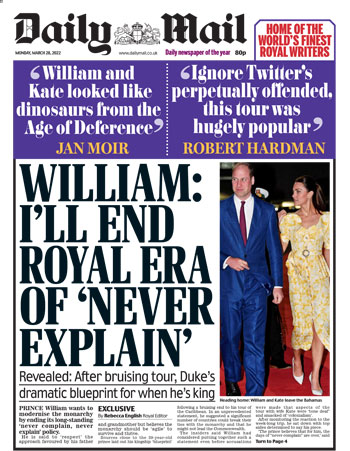
William and Kate went off to Jamaica where they met not adulation, but republicanism, and were helped immeasurably in their cause by the tour planners who thought it would be just a brilliant idea to recreate the jeep ride redolent of colonialism that the Queen had made half a century earlier. Still, they went scuba diving, Kate wore a lot of dresses and William promised that he’d be a bit more aware when he was king. He didn’t quite say “woke”, but that was the gist.
Princess Anne’s son-in-law went into the jungle with Matt Hancock. You can see what Harry means about the things these royals have to put up with.
So. We did the picture count last week. My heart wasn’t into logging all the stories, but Harry and Meghan turned up on a hundred or so front pages, against about sixty for Andrew. A lot of the Sussexes’ appearances were pictures or puffs, where Andrew tended to be a bigger deal. There were even some neutral (I don’t think I dare go so far as to say positive) stories about H&M, whereas all the Andrew stories were critical. People on social media who say, “stop attacking the Sussexes, why don’t you look at Andrew” might be surprised at how much the papers do look at him without forgiveness.
Technical issues mean we can’t reproduce my scruffy composites on this Notebook, but James tells me there is a way to link to them. So here you can see the Sussexes and here you can see the Yorks.
Politics
There was no escaping politics, either. Of course there never is, but Partygate, Beergate, a few sex and drug scandals and three prime ministers and four chancellors in a single year is quite a lot. Then there was the cost of living crisis: the whitetops gave us 46 splash stories about that and about the need for the government to do something to fix it – ideally tax cuts. They also gave us a dozen front pages on how important it was to keep the state pension triple lock to ensure we oldies get an inflation-proof pay rise. These are tough times. As I said in writing about Harry, when you are campaigning for something, you need to keep beating your drum so that you are heard.
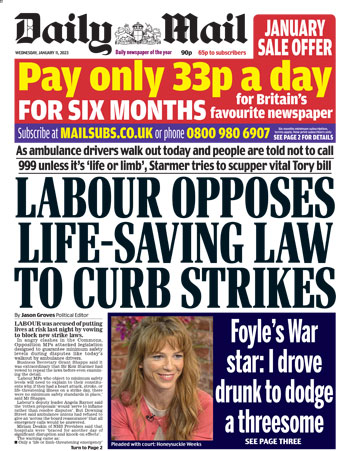
Unless you are a doctor, nurse, ambulanceman, railworker etc etc, who also wants an inflation-proof pay rise. There were 27 stories basically accusing them of holding the country to ransom. And as I write, today’s Mail splash is cross with Labour for refusing to back a “life-saving law” to curb strikes.
We’re sort of back to the “if you can’t stand the heat…” argument. If you don’t get paid enough to live on, and if you’re not allowed to stay away from work for a day or two to press your case for more money or better conditions, why would you not follow Thérèse Coffey’s advice and seek a better job elsewhere? It’s all about personal freedom and liberty. Those things the whitetops are supposed to cherish. (I say the whitetops, but they aren’t alone in this thinking; they just happen to be the ones I’ve audited on this section.)
I’m abdicating on the politics a bit here, because they formed such a big chunk of the Notebook commentary through the year, but – still with the whitetops, in this case specifically the Express – it has been quite the thing to see how many promises and vows and pledges are being made to “fix” the country and make everything better. We haven’t been living through an election campaign where you’d expect it, but through the 13th year of Conservative rule and the third year of the Johnson / Truss / Sunak administration. And that’s quite apart from the Boris boosterism. So here are a couple of collections of how everything is – or is going to be – wonderful.
And here, for balance, is a collection from the Mirror of how everything is just dreadful.
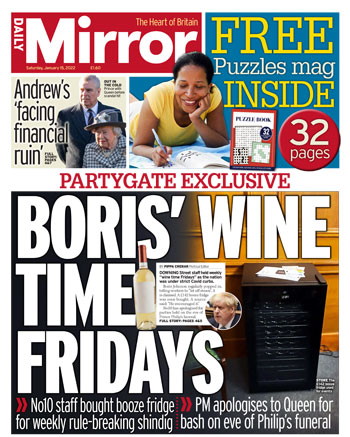
Of course, the single dominant political story in the first half of the year was Partygate. At the outset, everyone took it pretty seriously, but the Mail and Express soon tired of it when it looked as though their man might be in peril, while the Guardian and Mirror scented blood. It was quite refreshing to see the Telegraph resist opinionising on the news pages at least, while it was easier for the i and Times to stand aloof. The Star, as is its wont, popped up from time to time to mock, providing some of the bluntest political commentary of the year. The best thing about this is that it is coming from what is essentially an anti-snowflake, anti-woke right-leaning title.
[Ah yes, wokeness. That is the bane of all our lives, if you’re to believe the Clarksons and the Littlejohns and the Morgans. And if you can combine it with the Civil Service (aka the Whitehall blob) and working from home you’ve got a winning W ticket in the Mail lottery. Here’s a little sample.]

But back to the parties, here are some collections of how the tabloids and the heavies covered some of the key moments in that saga.
The Mail, of course, sought to turn the scandal on its head by pointing the finger at Keir Starmer and Angela Rayner over Beergate. We’ve compared in detail the coverage of the two “scandals” in the Mirror and Mail, but here’s a little reminder of how two Partygate “farce” headlines acted as bookends for the Mail’s all-out attack last spring. In the space of eleven days, it splashed on Starmer’s bottle of beer eight times, an intensity barely equalled even when Russia invaded Ukraine (16 in 20 days, including Camilla’s anguish, a general’s opinion and Britain’s kindness, resolve and generosity).

Immigration’s back
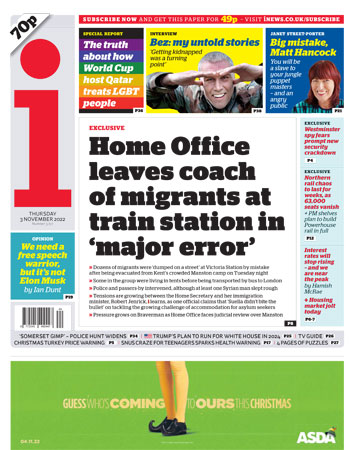
The other recurring story of the year was immigration. Nine years ago I noticed that certain papers seemed to be preoccupied with the subject, that the stories were almost universally hostile, and that they were appearing ever more frequently. There were so many that I set about logging the number of front-page splashes (positive or negative) about “foreigners”. There were about 80 in 2013, most of them at the end of the year as Romania and Bulgaria’s full accession to the EU – and hence rights to free movement – on January 1, 2014 approached. There were more the next year and still more in 2015, as the war in Syria led to thousands of people moving across Europe.
The EU referendum campaign of 2016 saw an explosion to 288 front-page leads across the national press – with 78 from the Express and just the one from the Mirror. Immigrants were coming here to mug our old ladies, milk our benefits system, steal all of our jobs and drive down wages. Leaving the EU would end all that. There was minimal press interest in official statistics showing that there were more immigrants from outside the community than within, or that, far from being a drain on NHS and other resources, people arriving from Europe contributed far more to the economy than either those coming from elsewhere or, indeed, the native population.
At the start of that year, immigration and the EU were low on Mori’s list of “most important issues to the country”, by the end of it they were at the top. Throughout that year, I would update and tweet what I called the “chart of shame”. Once Vote Leave had won the referendum, press interest in immigration seemed to fall off the White Cliffs of Dover and things returned to something near normal. To such an extent that I stopped the counting.
But now it’s time to start again. Because immigration has returned to the top of the political and news agendas. And, this time round, with greater justification. There is a clear imperative to stop people jeopardising their lives in small boats in the busiest shipping lane in the world. How we do that is a matter of legitimate public debate.

I personally don’t think that arranging to send a couple of hundred people out of the tens of thousands now arriving on the Kent coasts to Rwanda is a brilliant solution – or that employing expensive lawyers to fight for that cause through the courts is necessarily a great use of public money. But I’m no expert. I do think the Mail on Sunday was a bit premature to declare “Rwanda asylum plan is working” based on ten people deciding to go back home and after a week of bad weather put even the most callous traffickers off putting people in boats.
At least we’ve moved on a bit from the “steal our jobs”, “rob us blind” narrative. Because since Brexit and the pandemic and the departure of even settled Europeans who no longer felt welcome here, we have discovered that we don’t have enough doctors, nurses, fruit pickers, chambermaids. Businesses are begging for special visas to allow in the people we supposedly didn’t want. And the public is behind them. As I write, an email from a statistical organisation lands in my inbox saying that only a small minority wants to see fewer migrant workers in most occupations and more than half want more foreign doctors and nurses. Also, we are opening our doors to Ukrainian refugees.
So here is the collection of immigration front pages from 2022. There are 87 of them. If you look hard enough, there is actually some compassion in there these days – although only the Times and i splashed on the four who drowned in the Channel last month.
When I was compiling the old charts of shame, the Express always came top (or bottom, depending on your outlook) of the league. When Gary Jones took over the editorship, he repudiated his predecessor’s obsession and said that some of the headlines had given him sleepless nights. True to his words, the immigration splashes stopped at once. But, look, here is his paper back leading the charge. OK, without the venom and with more humanity, but it’s still ahead of the pack.

This particular one from November brought a wry smile. Given all the rhetoric over the past decade or so – the targets of getting net immigration down under 100,000, the taking back control of our borders, the Brexit benefits – for the figure to pass half a million is pretty shocking. (Regardless of your view on the advantages or otherwise of immigration, it has to be seen as a failure of policy.)
The Huw Whittow Express would have been appalled. But, in tune with the “promises, promises” outlook noted earlier, the present incumbent presents it as yet another minister vowing to fix something – and something that was supposed to have been mended by Brexit to boot.
Pet subjects

Every paper has its pet subjects. The Mirror and Sun, for example, are still finding Maddie stories around every corner.
The Sun also has its fascination with premier league footballers. This year has brought some serious stuff in that department, with two accused of rape, two more being suspected of sex attacks (these were many months apart and I’m not sure whether it was a good idea for them both to be illustrated by the same silhouetted player holding a ball about to leave the players’ tunnel), Ryan Giggs going on trial for domestic abuse.
Then there were brawls, altercations, gambling, cat-kicking, burglaries, racist abuse and, of course, sex (or lack of it), a fair bit of it involving Jack Grealish and Andy Carroll. And there was Ronaldo. Quite the haul, which you can see here.

As an aside, another favourite target of the Sun is the BBC. It’s always doing something wrong. And here it has earned the Sun my non-story-of-the-year award for “Married BBC star’s secret love child with stripper”. It’s quite the headline, but given that we don’t know who this person is, it is utterly meaningless. Let’s be charitable and say it’s there just to put down a marker for the future.

Salad days

As we’ve seen, the Star’s pet subject is anything at which it can poke fun. And never has it done so more successfully than when (picking up an original idea from the Economist) it branded Liz Truss “Lettuce Liz”. From live-streaming of an iceberg to the succession of headlines in the dying days of her brief administration, it was pure joy.
Front pages of the year
But there were other great moments for the Star – and for the other titles. So if you click the links below, you can see my completely arbitrary choice for the best front pages of 2022. A couple of them may be there because I agree with the sentiment, but there are others with which I completely disagree. Some simply look great, some are noble, some are witty, some have a good headline in an average-looking page. But having spent most of the year finding fault, it is nice to find things to smile at.
Page of the year? A hard one that. There have been many elegant and striking pages; nearly everyone came up trumps for the Queen and for the war in Ukraine. The Guardian produced several “specials”, breaking out of its conventional layout to project its serious investigations with some dramatic, if not always beautiful, covers.
And there was, of course, Partygate and all the surrounding dramas that were the beginning of the end of the Johnson era. Partygate was a real scandal, and by any measure Pippa Crerar had to be the journalist of 2022.
Yet my page of the year is quite a workaday-looking front from the Mail on Sunday. It was, in fact, far from workaday. This was the bullet in the starting gun that set off the resignation race that culminated in Johnson’s departure and brought us the chaos that ensued. He lasted just five days after it appeared. Yes, the Partygate disclosures and assorted other traumas had laid the ground, but this was the killer blow. Rarely does a single story have such an impact.
And there was more to it than that. It came from the Mail stable. In the months that followed, the paper’s daily sister repeated again and again that it was an act of collective hysteria by Tory MPs that had led to the defenestration of the most charismatic leader the country could wish for. This story resulted in the exact opposite of what the Mail titles wanted, but it was published anyway.
It was, for once, a triumph of journalism over politics and self-interest:
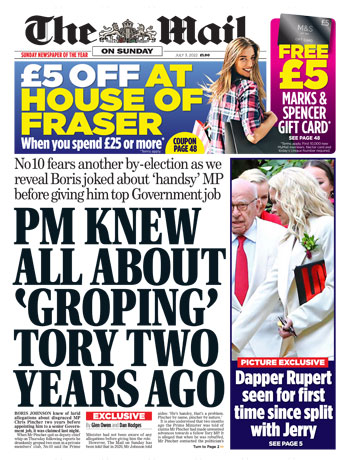
Liz Gerard’s Notebook is a fortnightly column published in the InPubWeekly newsletter. To be added to the mailing list, enter your email address here.












